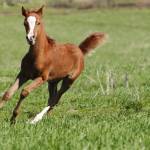Clostridial Infections Research May Benefit Horses

Diarrhea in foals and colitis-X in mature horses can be caused by infection with bacteria from the Clostridium genus, especially C. perfringens and C. difficile. Severe clostridial infections can be fatal. C. difficile has developed resistance to treatment drugs in some geographic areas, but a recent discovery offers the possibility that a more natural therapy may be developed in the future.
In the intestines of mice, a closely related bacterial strain, C. scindens, combats C. difficile infections by converting some molecules produced in the liver into a form that retards growth of the harmful bacteria. Mice treated with antibiotics to deplete gut bacteria were fed C. difficile spores and after a period of time, levels of this microbe were determined. Mice with lower levels of the harmful strain had abundant C. scindens populations, indicating that this strain was depressing growth of the disease-causing microbes.
C. scindens is also found in low numbers in human intestines, and there was a tendency for this microbe to be present in higher than normal numbers among human bone marrow transplant patients who did not develop C. difficile infections during recovery.
If this therapy using beneficial bacteria could be developed for veterinary treatment in horses, it might be a big step forward in clearing up common equine intestinal infections and possibly even preventing diarrhea and related growth slumps in foals.








